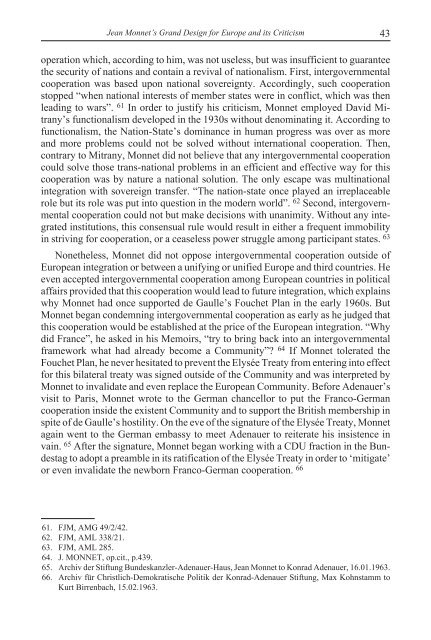Journal of European Integration History - Centre d'études et de ...
Journal of European Integration History - Centre d'études et de ...
Journal of European Integration History - Centre d'études et de ...
Create successful ePaper yourself
Turn your PDF publications into a flip-book with our unique Google optimized e-Paper software.
Jean Monn<strong>et</strong>’s Grand Design for Europe and its Criticism 43<br />
operation which, according to him, was not useless, but was insufficient to guarantee<br />
the security <strong>of</strong> nations and contain a revival <strong>of</strong> nationalism. First, intergovernmental<br />
cooperation was based upon national sovereignty. Accordingly, such cooperation<br />
stopped “when national interests <strong>of</strong> member states were in conflict, which was then<br />
leading to wars”. 61 In or<strong>de</strong>r to justify his criticism, Monn<strong>et</strong> employed David Mitrany’s<br />
functionalism <strong>de</strong>veloped in the 1930s without <strong>de</strong>nominating it. According to<br />
functionalism, the Nation-State’s dominance in human progress was over as more<br />
and more problems could not be solved without international cooperation. Then,<br />
contrary to Mitrany, Monn<strong>et</strong> did not believe that any intergovernmental cooperation<br />
could solve those trans-national problems in an efficient and effective way for this<br />
cooperation was by nature a national solution. The only escape was multinational<br />
integration with sovereign transfer. “The nation-state once played an irreplaceable<br />
role but its role was put into question in the mo<strong>de</strong>rn world”. 62 Second, intergovernmental<br />
cooperation could not but make <strong>de</strong>cisions with unanimity. Without any integrated<br />
institutions, this consensual rule would result in either a frequent immobility<br />
in striving for cooperation, or a ceaseless power struggle among participant states. 63<br />
Non<strong>et</strong>heless, Monn<strong>et</strong> did not oppose intergovernmental cooperation outsi<strong>de</strong> <strong>of</strong><br />
<strong>European</strong> integration or b<strong>et</strong>ween a unifying or unified Europe and third countries. He<br />
even accepted intergovernmental cooperation among <strong>European</strong> countries in political<br />
affairs provi<strong>de</strong>d that this cooperation would lead to future integration, which explains<br />
why Monn<strong>et</strong> had once supported <strong>de</strong> Gaulle’s Fouch<strong>et</strong> Plan in the early 1960s. But<br />
Monn<strong>et</strong> began con<strong>de</strong>mning intergovernmental cooperation as early as he judged that<br />
this cooperation would be established at the price <strong>of</strong> the <strong>European</strong> integration. “Why<br />
did France”, he asked in his Memoirs, “try to bring back into an intergovernmental<br />
framework what had already become a Community”? 64 If Monn<strong>et</strong> tolerated the<br />
Fouch<strong>et</strong> Plan, he never hesitated to prevent the Elysée Treaty from entering into effect<br />
for this bilateral treaty was signed outsi<strong>de</strong> <strong>of</strong> the Community and was interpr<strong>et</strong>ed by<br />
Monn<strong>et</strong> to invalidate and even replace the <strong>European</strong> Community. Before A<strong>de</strong>nauer’s<br />
visit to Paris, Monn<strong>et</strong> wrote to the German chancellor to put the Franco-German<br />
cooperation insi<strong>de</strong> the existent Community and to support the British membership in<br />
spite <strong>of</strong> <strong>de</strong> Gaulle’s hostility. On the eve <strong>of</strong> the signature <strong>of</strong> the Elysée Treaty, Monn<strong>et</strong><br />
again went to the German embassy to me<strong>et</strong> A<strong>de</strong>nauer to reiterate his insistence in<br />
vain. 65 After the signature, Monn<strong>et</strong> began working with a CDU fraction in the Bun<strong>de</strong>stag<br />
to adopt a preamble in its ratification <strong>of</strong> the Elysée Treaty in or<strong>de</strong>r to ‘mitigate’<br />
or even invalidate the newborn Franco-German cooperation. 66<br />
61. FJM, AMG 49/2/42.<br />
62. FJM, AML 338/21.<br />
63. FJM, AML 285.<br />
64. J. MONNET, op.cit., p.439.<br />
65. Archiv <strong>de</strong>r Stiftung Bun<strong>de</strong>skanzler-A<strong>de</strong>nauer-Haus, Jean Monn<strong>et</strong> to Konrad A<strong>de</strong>nauer, 16.01.1963.<br />
66. Archiv für Christlich-Demokratische Politik <strong>de</strong>r Konrad-A<strong>de</strong>nauer Stiftung, Max Kohnstamm to<br />
Kurt Birrenbach, 15.02.1963.

















